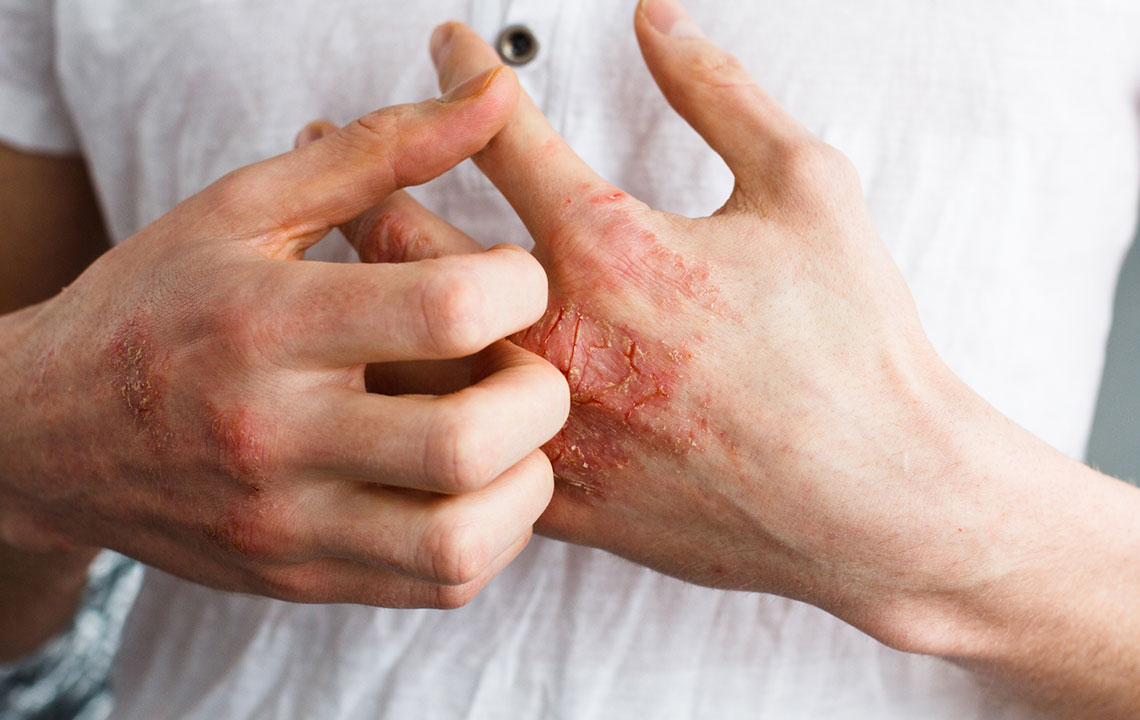Foods to Eat and Avoid for Patients with Eczema
Eczema, also known as atopic dermatitis, is a condition that makes one’s skin itchy and dry. Although the exact cause is unknown, some studies have linked this condition to an overactive response of the nervous system to an irritant. Although topical creams and other types of medications can help manage the condition, doctors may recommend certain types of foods and lifestyle changes to coexist with the condition efficiently.

Who are at risk of developing eczema?
People who have a family history of eczema are at risk of developing the condition. Moreover, children and infants who are born into families having a history of allergic diseases such as asthma or hay fever are also at an increased risk of suffering from eczema.
Which are some foods that can be beneficial for patients with eczema?
Since people with eczema often develop food allergies, one will need to examine their personal food preferences to make sure there are no further risks of the same. Some of the most common allergy triggers are usually associated with food items such as eggs, cow’s milk, gluten, soy products, fish, nuts, and shellfish. However, not everyone with eczema responds in the same way to these food items.
It is important to understand that eating certain foods will not cause eczema per se, but it may trigger flare-ups in those suffering from this condition. So, it is recommended to follow an eczema-friendly diet to help manage the condition in a better way. No two patients with eczema will have the same reactions to certain types of foods.
Some of the important components of an eczema-friendly diet are almost the same as an anti-inflammatory diet.
- Fish is a natural source of omega-3 fatty acids which are capable of fighting inflammation effectively. Some examples of fish that have high levels of omega-3 acids include tuna, mackerel, salmon, sardines, and herring.
- Probiotic foods can help patients with eczema as they contain good bacterial culture which help promote gut health; some common types include yogurt, tempeh, and miso soup. Fermented drinks and foods, also contain probiotic; these include kombucha, kefir, sauerkraut, naturally fermented pickles, and soft cheeses like Gouda.
- Fruits and vegetables containing quercetin such as cherries, broccoli, kale, and spinach can help in fighting inflammation.
7 beneficial foods for patients with eczema
- Banana is rich in potassium and is beneficial for people with eczema
- Potato is rich in potassium, vitamin C, and fiber
- Chicken or beef broth are rich in the skin-repairing amino acid, glycine
- Green onions are excellent sources of vitamin K and are beneficial for the skin
- Rice milk is hypoallergenic, low in chemicals, and safe for patients with eczema
- Buckwheat is gluten-free and has strong anti-inflammatory properties as well
- Mung bean sprouts are alkalizing foods that can help in managing eczema
There are different types of foods that are eczema friendly; however, one will have to exercise caution when consuming them. As what might not be a trigger for one, may cause flare-ups for another. If this is the case, one can choose to eliminate certain foods from their diet for at least a fortnight and then slowly introduce them to the diet to see if there is any reaction. As food allergies may take some days to surface, one might need to wait for a few days before making the call of including or elimating certain foods from their diet.
Sometimes, foods that are believed to be eczema-friendly may cause flare-ups if one is allergic to them. Any food-related reaction will usually occur within 6 to 24 hours post-consumption. At times, the reactions may be delayed even more.
What are some types of foods that may cause reactions?
To identify foods that may trigger allergic reactions, doctors recommend an elimination diet. In this diet, one is expected to avoid certain foods which are commonly responsible for causing eczema. However, before one excludes any of these foods from their diet, they should ideally add these to one’s meals for about 4 to 6 weeks to notice any changes. If one finds that the symptoms are worsening, then the particular food item should be excluded from the diet. However, if one notices that their symptoms are not deteriorating any further, then they may not be required to exclude the food item.
Some foods that may trigger eczema flare-ups and may need to be eliminated from one’s diet include citrus fruits, gluten, soy, spices like cloves and cinnamon, nuts like pinenuts and peanuts, and tomatoes.
Is there any specific eczema-friendly diet?
There is no universal meal plan for people with eczema. However, it is believed that a diet rich in antioxidants can help reduce the symptoms significantly. For instance, the Mediterranean diet focuses on eating more vegetables, fruits, and fish. It also includes healthy fats like olive oil and red wine which is rich in quercetin.
Likewise, an anti-inflammatory diet will eliminate all foods that can increase inflammation. It focuses more on eating fiber-rich foods such as whole grains, vegetables, fruits, fish rich in omega-3 fatty acids, and healthy fats.
If one notices any symptoms of eczema, they should visit their doctor at the earliest.











